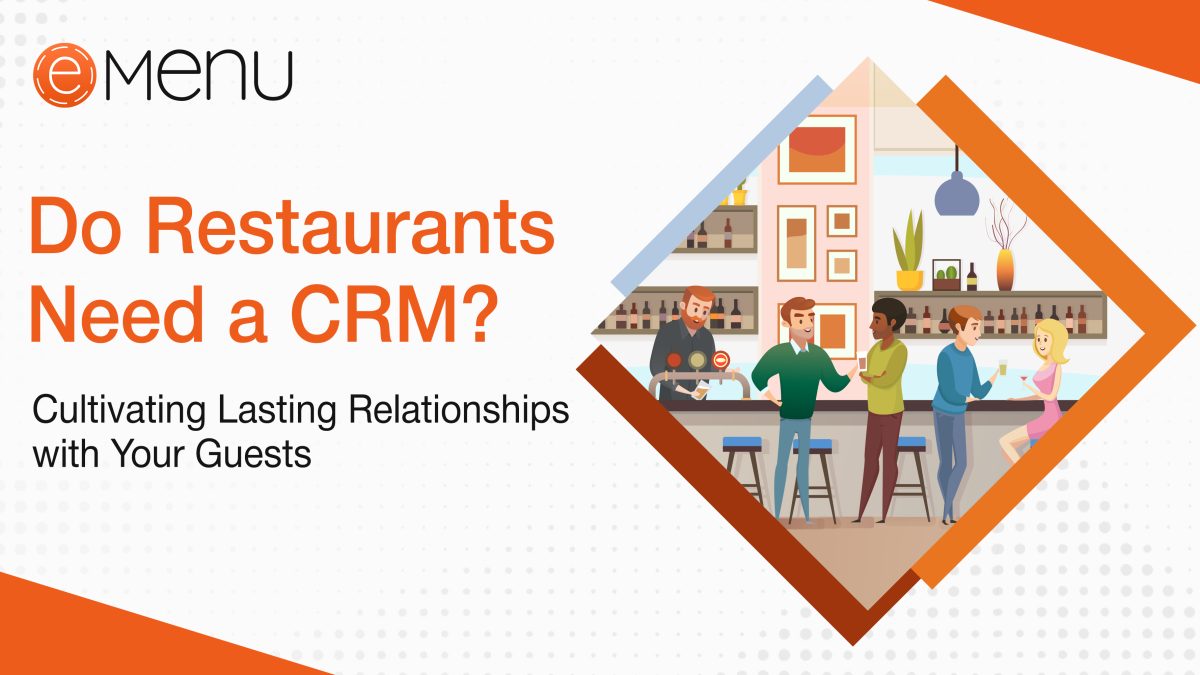In the competitive world of restaurants, where customer satisfaction reigns supreme, building strong relationships is key to success. But how do you manage a growing base of diners, personalize their experiences, and keep them coming back for more? This is where a Customer Relationship Management (CRM) system can become your secret weapon. But many of you still have a question that Do Restaurants Need a CRM?
No Need Worry! we Online eMenu, best restaurant management software’s team is here to answer and resolve your queries.
First, let understand..
What is a CRM and How Can it Benefit Businesses?
A CRM is a software solution that helps businesses manage interactions and data associated with their customers. It acts as a central hub for storing customer information, tracking communication, and analyzing purchase history. CRM functionalities extend beyond simple data storage, offering tools for targeted marketing campaigns, loyalty program management, and even streamlining internal operations. By understanding customer preferences and behaviour, businesses can personalize their approach, leading to increased sales, improved customer retention, and overall business growth.
Want to Master the Art of Restaurant Success: A Comprehensive Guide to Customer Relationship Management in the Food Industry Learn More
Why Restaurants Can Thrive with a CRM
For restaurants, the benefits of a CRM are multifaceted, impacting both the customer experience and the bottom line. Here’s how a CRM can transform your restaurant operations:
Enhanced Customer Experience:
- Personalized Communication and Marketing: A CRM allows you to segment your customer base and tailor your communication accordingly. Birthday greetings, special offers for high spenders, or targeted email blasts promoting new menu items based on past orders – a CRM empowers you to connect with each guest on a personal level, fostering a sense of value and appreciation.
- Efficient Reservation Management and Table Handling: Gone are the days of juggling reservation calls and handwritten seating charts. A CRM streamlines the reservation process, allowing guests to book online, manage their reservations, and receive confirmation emails with ease. Staff can also utilize the CRM to efficiently seat customers and track table availability, reducing wait times and improving overall restaurant flow.
- Feedback Collection and Analysis for Better Service: CRMs often integrate with online review platforms and offer built-in features for collecting customer feedback via surveys or post-dining emails. Analyzing this feedback allows you to identify areas for improvement and implement changes that directly address customer concerns.
Allure your customers with a CRM integrated online ordering system. Read More
Increased Customer Retention:
- Loyalty Program Management and Rewards: A CRM simplifies loyalty program management. Track customer spending, reward frequent diners with points or exclusive offers, and incentivize repeat visits. Recognizing and rewarding loyal customers fosters brand affinity and keeps them coming back for more.
- Win-back Campaigns for Lapsed Customers: CRM data can identify customers who haven’t visited in a while. Targeted email campaigns offering special discounts or reminding them of their favorite dishes can rekindle their interest and bring them back through the door.
- Special Offers and Promotions for Valued Customers: Segment your customer base and send targeted email blasts with special offers or birthday promotions. This personalised approach shows your customers you value their business and encourages them to return.
Know How To Build A b2b Loyalty Program? Read Full Article
Streamlined Operations:
- Centralized Customer Data Management: Say goodbye to scattered spreadsheets and sticky notes. A CRM provides a central location to store all your customer data, including contact information, dining preferences, allergies, and past orders. This makes it easy for your entire staff to access relevant information and deliver a consistent, personalised experience.
- Improved Staff Communication and Task Management: Many CRMs offer internal communication tools that can be used to streamline staff communication and task management. This can improve coordination, reduce errors, and ensure a smooth dining experience for your guests.
- Data-driven Decision Making for Menu Planning and Promotions: Analyzing customer data through your CRM can reveal valuable insights into ordering trends, popular dishes, and customer preferences. Leverage this data to inform menu planning, tailor promotions to maximise appeal, and ultimately boost your revenue.
Want to know Why do you need a restaurant management system? Read More
Potential Concerns and Considerations
While a CRM offers numerous benefits, there are a few considerations to keep in mind:
- Cost of CRM Implementation: CRM solutions come in various pricing tiers. Carefully evaluate your needs and budget to find the right fit for your restaurant.
- Time Investment in Data Entry and Management: Maintaining accurate customer data is crucial for a CRM’s effectiveness. Be prepared to invest some time in data entry and ongoing data management.
- Choosing the Right CRM for Your Restaurant’s Needs: With a variety of CRM options available, it’s important to choose one that caters to the specific needs of your restaurant. Consider factors like your restaurant size, type of cuisine, and budget when making your selection.
Want to Integrate best restaurant management software? Contact Online eMenu.
Conclusion: Building Long-Term Relationships with Your Guests
While the decision to implement a CRM depends on your specific restaurant operation, the potential benefits are undeniable. A CRM empowers you to cultivate lasting relationships with your guests, personalize their dining experience, and ultimately drive long-term success for your restaurant. By fostering customer loyalty and optimising operations, a CRM can be the key ingredient to taking your restaurant business

